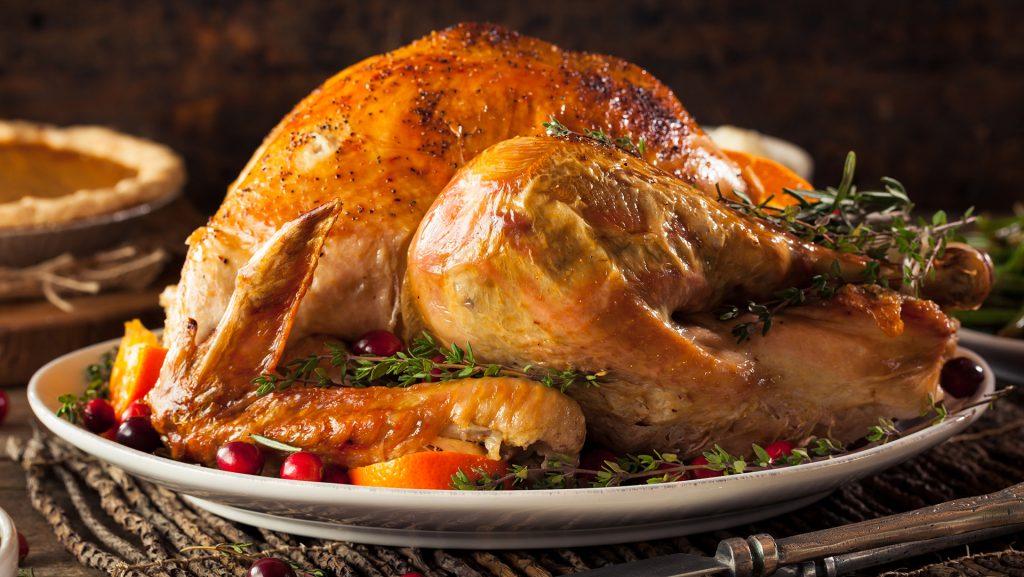Opinion | It’s time to confront the truth behind Thanksgiving
The history of Thanksgiving is much more violent than the common narrative many are taught in schools.
A turkey set for a Thanksgiving dinner is seen. (Dreamstime/TNS)
November 16, 2021
Thanksgiving is quickly approaching, and it’s important to recognize the real history behind the holiday. Unlike what I learned in school, the history behind Thanksgiving is the history of genocide and displacement of Indigenous people in America.
In school, I was taught that Thanksgiving commemorates the wholesome union between pilgrims and Indigenous people in America. I remember being a first grader, my classmates and I tracing our fingers and turning them into turkeys, as we were fed this misleading history.
It’s become more and more apparent over time that the history I was taught in my K-12 schooling was not meant to represent the contributions and experiences of all people in this country. In contrast to what I was taught in school, this holiday is not based on any peaceful union, but has much more gruesome roots.
The traditional feast is known to have taken place at Plymouth Colony where pilgrims and the Wampanoag people joined and feasted after the Mayflower arrived in America. In reality, the Wampanoag people had been enslaved by Europeans a century before and experienced their property being swept away and saw disease riddle the tribe.
It’s important to stop pushing the very harmful and inaccurate narrative that Thanksgiving is founded on peace and unity. Like many central parts of American tradition and history, it is founded on the oppression of Indigenous people.
Thanksgiving became a recognized holiday in Iowa somewhere between 1838 and 1841, after it is believed that Europeans from the West came and established it here.
While Thanksgiving might be a fun celebration for some ffamilies, it may not hold the same light-hearted meaning for many Indigenous people. As a country, we need to address these crimes and recognize what this country, as we know it, was actually founded on.
Abigail Buffalo is an undergraduate student studying health and human physiology. Buffalo grew up on the Meskwaki settlement in Tama, Iowa.
“I am half-white, half-Indigenous, and growing up, there was the Meskwaki Settlement school and South Tama. I went to South Tama and never learned about the real history of Thanksgiving. We never learned about the genocide and injustices Indigenous peoples face,” Buffalo said. “When I was younger, we used to do some of the traditional things, but now when I go home, we don’t really celebrate Thanksgiving in that way.”
To this day, the way Indigenous people are represented in the media and society is incredibly disrespectful and dehumanizing. Indigenous people are continually erased and mistreated through mascots, costumes, and clothing misrepresenting and misusing Indigenous culture.
In Iowa, 66 K-12 schools use mascots that have Indigenous symbols or names. The Iowa Department of Human Rights sent a letter to Gov. Kim Reynolds addressing this issue. The letter cited how seeing Indigenous people and culture belittled by caricatures and mascots is shown to be harmful to the mental health of Indigenous people.
While much of this cultural appropriation and harm may come from a place of not knowing, this Thanksgiving it’s important to address the gaps in my knowledge about Indigenous history in Iowa and the U.S. as a whole.
To support Indigenous students on campus There are numerous campus events this month to support Indigenous students. There is an event for food sovereignty and healing trauma. On Thanksgiving, there will be a virtual presentation on “Truthgiving” on Nov. 18.
Check out this and other events hosted by Indigenous groups on campus at the University of Iowa Multicultural & International Student Support & Engagement webpage.
Columns reflect the opinions of the authors and are not necessarily those of the Editorial Board, The Daily Iowan, or other organizations in which the author may be involved.



